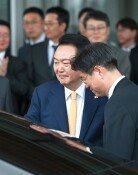Dangerously low power reserve ratio
Korea is feared to suffer summer power shortages. With the heat wave continuing, power consumption for air conditioning has been soaring. Reserve power reached 3.16 megawatts at one point Thursday for a reserve rate of 4.9 percent. This means the nations power supply level fell below 4 megawatts, the first stage of an emergency in power supply. This is the first time for the figure to fall below 4 megawatts since the country suffered massive power outages on Sept. 15 last year.
If the reserve power figure declines below 3 megawatts, the government adjusts the voltage and takes second-stage emergency measures to suspend power supply to certain companies. If it declines to less than 2 megawatts, third-stage emergency conservation measures are taken to halve power consumption of major industries. As reserve power fell below 3.16 megawatts Thursday, a power shortage crisis is feared for July and August, when the sweltering heat is in full swing.
No new power plants began operating this year, and existing plants that operated in full capacity last winter are undergoing maintenance. In addition, many power plants went out of service due to either breakdown or accident. In a situation where power supply cannot be increased immediately, the only way to cope with power shortages is energy conservation.
From early this month, the government began fining crowded facilities that use air conditioners with their doors left open. A power consumption promotion committee led by civic groups has been also set up. Per capita consumption growth of electricity in Korea is the highest among member countries of the Organization for Economic Cooperation and Development. So what is urgently needed is control of power demand. In Japan, people actively participate in government campaigns for energy conservation though not mandatory. If the Japanese do this, Koreans can do, too. Koreans united in the gold collection campaign when the 1997 Asian currency crisis hit, and they must come together again to save energy.
Even if Korea avoids a power crisis this summer, energy saving campaigns themselves cannot resolve power shortages. Scrambling to build power plants to meet the surging demand is also undesirable. If such plants are built to produce electricity for peak hours in summer and winter, this can lead to waste of infrastructure. Cheap electricity prices are also encouraging power consumption. Last winter, the government required businesses to save 10 percent of electricity, but power consumption grew as much as 33 percent from the previous year. This means that demand will not fall without a rise in electricity prices. Since electricity cost is lower than those of oil and gas, Koreans use electricity, which is a high-quality energy with the highest production cost, for heating. The government should raise electricity rates and expand conservation incentives to reduce energy consumption.







